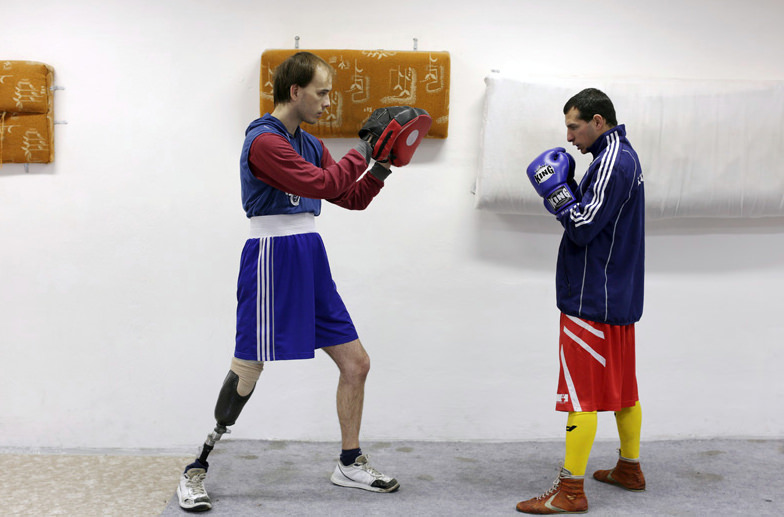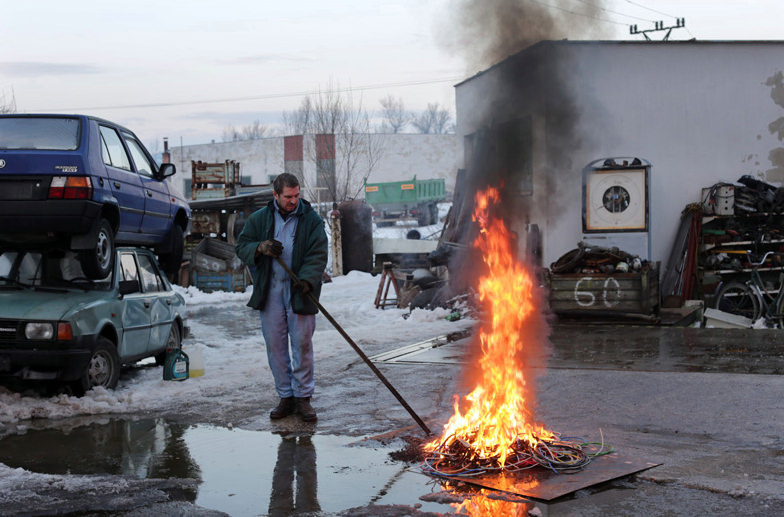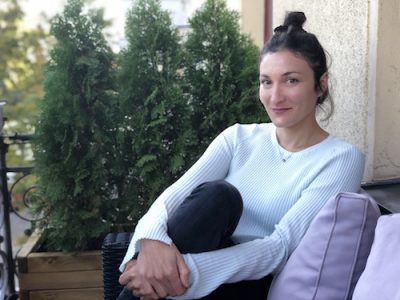Berlinale 2015: A Q&A With The Filmmakers & Star of Koza
A bleak, beautiful entry from Slovakia in the year’s Berlinale, Koza starts off slow and static and stays that way, even as worlds heap themselves on the titular main character. An uncommon blend of reality and fiction, the film stars the real life Koza, birth name Peter Baláž, more or less as himself. The Roma boxer competed in the 1996 Atlanta Olympic games for Slovakia, returned home, and over the ensuing years, slipped back into the chronic poverty that’s typical of what many Roma face across Europe. So did the film’s Koza. On screen, he collects scrap metal for money while training through a cheerless Slovakian winter. When he needs money for an abortion for his girlfriend, Miša (also played by Koza’s real-life wife, in their family home), he goes back on the road with his crooked manager, Zvonko (Zvonko Lakčević, a non-actor whom the director knew from film school). Miša has one child already, and they can’t afford a second. He wants to keep the baby, though — the abortion money is only to placate Miša. Koza seems helpless but totally loving, and the quiet scenes where he gently touches the back of his little stepdaughter’s head, or pets the scrappy family dog interrupting his push-ups, are heartrendingly tender in this dismal setting. The matches he goes off to fight are tough to stomach — at this point in his fictional career, Peter is boxing to stay standing, not to win.
Real life and fictional Koza both began boxing as a means to bring back his father, a champion boxer who together with his mother, had nine children. They left Koza to be raised by his grandmother; his nickname, which means goat, stems from the goat milk on which she raised him in Žilina. He and the film’s director, Ivan Ostrochovský, grew up down the street from one another, and this is his second film starring Baláž, after a short documentary, Pietro Pascalo. It’s also Ostrochovský’s second time at the Berlinale, after showing Velvet Terrorists last year.
After Koza's Berlinale premiere, we sat down with Ostrochovský, cinematographer Martin Kollár, and Koza himself, who spoke enthusiastically of his time in the U.S. A translator was on hand for Ostrochovský and Koza’s portions of the interview.
With your screenplay directly inspired by Koza’s life, how close were the settings and minor characters to reality?
Ivan Ostrochovský, via translation: That was Koza’s house, it’s his wife, but this was not his child. The manager was not the real manager. In the beginning we thought about making a documentary, but then we based it on Koza’s life. He had this abortion problem he wanted to solve [with three children, he and his wife were unable to afford another] and Marek Leščák, the screenwriter, and I gave him some money to pay for the abortion, and then the story begins. In some parts, it’s based on his life, because Peter is still boxing, but the story you see is made up, it was written.
We were rehearsing in the beginning and we had actors to play the manager of Koza, but they were over-acting with Koza and the chemistry was not that good. Then we got the idea to introduce Zvonko, who was a student at the school where I studied, and the chemistry with Koza worked quite well. He’s not a professional actor.
How about the boxing scenes? Was Koza really boxing?
IO: They’re real. We went to the match, introduced Koza, and were shooting the real fight. Some of them were made up, it’s a combination of what was real and what was prepared. It was a funny thing, because we were traveling the whole time with Koza and Zvonko, his manager in the movie, and when we went to the matches, everyone was asking Koza whether he had a manager. And he was saying, no I don’t have a manager, I only have an actor who pretends.
Did he find a manager that way?
IO: Yes, he does have a manager now.
Can you talk a little bit about Koza’s position in the Roma community? How does a member of this typically disenfranchised group make it to the 1996 Summer Olympics, for example?
IO: During the socialist era, you had heavy industry in every region of Slovakia. Each industry had their own sports clubs, and every one had a boxing club, so you had a club in each region. Peter was boxing from age 13. It was at the end of the Socialist era that companies were privatized, and cut the budget for all the activities. At that time for Koza, it was a little more difficult, but I think in 1996, there was still continuity from the past, so he got support to go to the Olympics. But after he got back, it got worse, from year to year.
So there’s not much support in place, even for someone as accomplished as he is?
IO: Maybe there was support right after the Olympics, but not much community to take care of the athletes. There’s Ján Franek [a Russian boxer who competed for Slovakia] in the Olympics in 1980, and at the moment he’s homeless. He was also in the movie, he trains Koza.

How did he get involved in the film?
IO: He’s also from Žilina. We asked him whether he wanted to participate, and he agreed.
Can you tell me about the town you're both from?
Martin Kollár: It’s funny that we’re talking about it. Years ago we had a friend, and he had a bar, and we used to go together. We’re sure we saw each other, but we never knew each other [Kollár is also from Žilina]. Ivan and Koza knew each other, because they lived 500 meters from each other. But Ivan left for Bratislava for studies and Peter was boxing, so…
It’s about 150,000 people. It used to be housing for the guys who work on the train. And then they just abandoned the housing, and the Gypsy community took over. It was almost like a punishment — these underprivileged people were sent to this social housing. They try to fix it up but it’s always like this.
Is there a future there? Will it improve?
IO: There’s a social net, it’s really there so even the people in the worst condition have a chance to be supported by the government, [at least a little]. But they’re kind of trapped in that situation.
Is Koza still boxing? How old is he? When will he retire?
IO: He’s 40, but he’ll retire in a year or two. It’s the only thing he can do for a living, but he gets social support, it’s about 100 euros a month, so he’s still fighting. It’s about 400 for a match, but when you’re fighting for real, you can only do it once in a month. If you get injured, you have to stop for three months. In the movie he’s fighting every three weeks, but it’s made up that he could fight that much.
And Koza never had a manager like the crooked Zvonko, in the film, right?
It’s a little bit different. The manager just arranges the matches, he doesn’t travel with him all along.
How was the film shot? How long did the filming take?
MK: We decided to use the most simple technology, so we shot on 5D, using special lenses made for filmmaking. What our concept was from the beginning was difficult, because we decided to combine two things, using very static, long shots, but in combination with non-professional actors. So we created a stage, and we asked them to act inside. It was basically very difficult for them. You cannot cut out, do a close up. So every scene, even if it’s just one minute, has to be done properly. Many times, it was very difficult, with Koza, to remember all the lines. We have a lot of funny stories.

Can you tell me one?
MK: What happened was we had a scene [at the beginning of the film] and we shot it ten times, and we got exhausted. It was a sentimental scene, where Koza completely messed up the text. We were short on time, and he was supposed to be asking for money for the abortion. Instead, he said, I have to announce that my kid was just born!
What do you expect the reaction to the film to be like? Are there many films made in Slovakia with Roma protagonists?
IO: There were three recent movies. There was Gypsy, by Martin Sulik, three years ago. This is not a film about gypsies, even though Koza is a gypsy. It’s about a poor guy, who doesn’t get much money, but I don’t know…we didn’t want to open the topic on gypsies, we have Zvonko, who’s a white guy and Franek. People will appreciate it, somehow.
MK: I told the audience after the first screening that the hope is in the fight, basically to try to fix his situation.
Because the film was so still, everything seemed so frozen, including people’s lives. Was that an intentional comparison?
MK: Yes, but Ivan was also saying, Koza was born in the same conditions, and managed to go to the Olympic games.
Is Koza famous, at least within Slovakia? Do people still recognize him?
IO: Yeah people who box really know him, but in the mainstream, probably not. Well, maybe after this film! In his hometown, people know him.
Peter, what are your thoughts about making the film? And on your the arc of your career?
Peter Balaž, via translation: When I’m in in a real match, I know when it ends, maybe eight rounds. When we’re shooting, I don’t know, because it’s up to the filmmakers. I had to rehearse and repeat the scenes a lot, but I enjoyed the shooting, and I’d like to repeat it, if there’s a next film.
When I was young, I went to Italy for some boxing, and saw a boxing legend named Pietro Pascalo. When I was back in Slovakia, boxing, I stood in front of a mirror, copying the movements of Pietro Pascalo, and my coach came in and happened to say, “come on Pietro, let’s go to training.” I went to the office to try to change my name to Pietro Pascalo, but they told me someone from my family should have this name, to be able to change it. But I still call myself Pietro Pascalo, and it’s on my business cards. [The name eventually became the title of a short documentary Ostrochovský made on Balaž.)
I really like Muhammed Ali, because he has the same CV as me. (Translator — I don’t know in what way.) When I was at the Atlanta games, I saw they returned a medal to Muhammed Ali that he had thrown away in a restaurant that wouldn’t serve him. I started boxing when I was 13, and maybe I will continue for the next 2 years, but all the trophies I’ve gotten, they have no value. Nobody respects them. So I’ve just given them away. I have very good memories from the Olympic games in Atlanta, because I was accepted by the community and by Americans as an equal, as a boxer. [He has problems in Slovakia, with people judging him. So he felt really good there, people accepted him as a sportsman, on the basis of what he could do, the translator interjects.]



